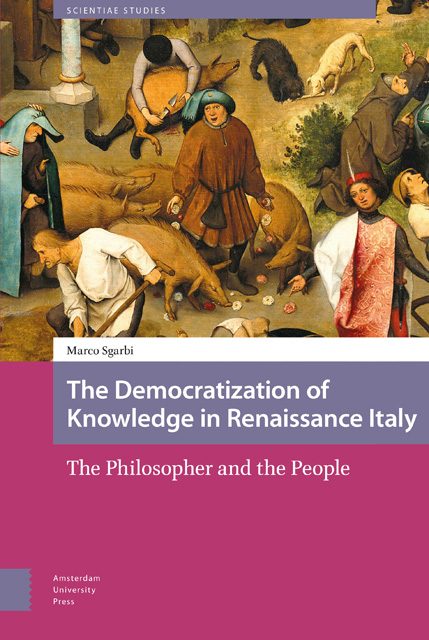1 - Introduction
Published online by Cambridge University Press: 15 June 2023
Summary
Abstract
The introduction identifies to what extent it is possible to speak of a democratization of knowledge in Renaissance Italy. It establishes the boundaries of the present investigation within the Aristotelian tradition, and outlines democratization as a process capable of assigning power to people. It anticipates how the democratization of knowledge historically is invested equally in ideas from religion and philosophy, involving the same democratizers, moved by similar intentions, employing identical techniques of vulgarization and targeting equivalent communities of recipients.
Keywords: Democratization, Knowledge, Process, Philosophy
In a seminal contribution to the definition of the “history of knowledge,” the illustrious English historian Peter Burke writes that the second half the twentieth century was “the great age of the democratization of knowledges, thanks in part to radio lectures, televised science, open universities and online encyclopaedias.” Nothing on a similar level occurred, obviously, in the Renaissance. Nothing of the same magnitude or significance. However, something certainly occurred in the Renaissance, something that seems to point to a process of democratization of knowledge. New instruments and means of gathering, producing and disseminating knowledge – the printing press is but one example – emerged. New languages – vernacular ones – established themselves as languages of knowledge. New approaches to spirituality and religion were born with the Reformation and the spread of heterodox groups in Europe. Not irrelevant issues at the time, but central topics that historians have characterized – albeit in their very different interpretations – as foundational elements of the Renaissance. Yet, it is still legitimate to ask to what extent we are facing here a genuine process of democratization of knowledge.
Many are the critical voices that have been raised against a too simplistic and indiscriminate acceptance of the idea of democratization of knowledge. In relation to idioms, for instance, as Burke himself asserts, “to write in a vernacular language was to widen access to many knowledges in one way, by making them available to social groups that had not learned Latin … however, writing in a vernacular narrowed access in another way, access for foreigners.” This is for instance the famous case of Galileo Galilei and his two major masterpieces mainly written in the vernacular, namely the Dialogo sopra i due massimi sistemi del mondo and the Discorsi e dimostrazioni matematiche intorno a due nuove scienze, and only later translated in Latin.
- Type
- Chapter
- Information
- The Democratization of Knowledge in Renaissance ItalyThe Philosopher and the People, pp. 9 - 18Publisher: Amsterdam University PressPrint publication year: 2022

